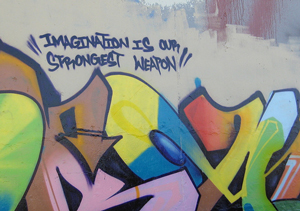
Source: Rowing fail, skittledog, Flickr
Row, row, row your boat
Gently down the stream.
Merrily, merrily, merrily, merrily,
Life is but a dream.
As a child, you may have learned to sing this tune by the time you were three. As you got older, you might have heard synonyms and the same tune used to turn the little nursery song into a discourse about modern life.
Propel, propel, propel your craft
—Fred Rogers (TV host and producer of “Mr. Rogers’ Neighborhood”)
Softly down liquid solution.
Ecstatically, ecstatically, ecstatically, ecstatically
Existence is but an illusion.
So what does this discussion about a children’s song have to do with learning to write a story? Writing a story is all about choices. You have to decide on a plot, characters, a point of view, and a setting. You also have to decide on the style and tone that you want the story to have.
You make the choices about tone and style by using certain literary strategies and devices to make your story come alive. Let’s look at the tone and style of the two versions of “Row, Row, Row Your Boat.”
In the original version, the writer chose words to suggest peace and happiness: “row,” “gently,” “merrily,” and “dream.” The song writer chose these words in keeping with the peaceful, sweet words and ideas that are often found in young children’s rhymes and songs. However, when you examine the revised version, you see that the new word choices change the style and tone.

Source: Imagination, Jason-Bennett, Flickr
Because the writer has chosen vague words like “craft” and “solution,” the song becomes ambiguous. We could be on a hovercraft, a raft, or some futuristic transportation device. We could be propelling ourselves through any of a thousand kinds of solutions: water, sludge, detergent, etc.
The tone and style of the second version lead to an unclear ending: “Existence is but an illusion.” The meaning of the song becomes somewhat more adult and darker—all because of word choices the writer made.
In this lesson, you will learn how to make choices and write an imaginative story that uses literary strategies and devices to enhance style and tone.